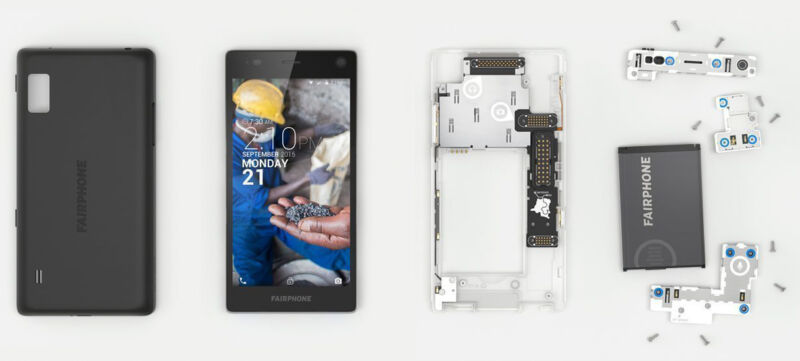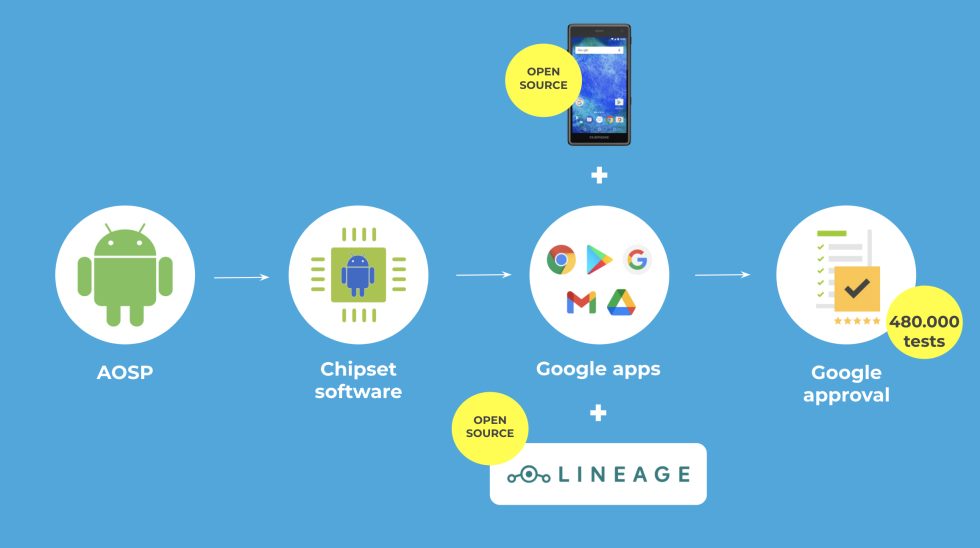
Fairphone—the sustainable, modular smartphone company—is still shipping updates to the 5-year-old Fairphone 2. The company won't win any awards for speed, but the phone—which launched in 2015 with Android 5—is now being updated to Android 9.0. The most interesting part of this news is a video from Fairphone detailing the update process the company went through, which offers more transparency than we normally get from a smartphone manufacturer. To hear Fairphone tell the story of Android updates, the biggest barrier to longer-term support is—surprise!—Qualcomm.
Fairphone wants consumers to keep their phones for longer, creating less e-waste and carbon emissions via modular replacement parts that are easily upgradeable and repairable. A big challenge for designing a long-lasting phone like this is software support. Even if Fairphone wanted to support a phone forever, Android software updates do not work that way, and major OS updates normally rely on a relay race of companies that all need to hand-off a build of Android before it reaches your phone.
We've gone over this before, but let's do a quick recap of how Android makes it to your smartphone. First, Google releases builds of AOSP (the Android Open Source Project) to everyone. This doesn't run on a phone yet, though. First, your SoC (System on a Chip) manufacturer (usually Qualcomm) has to get hold of it and customize Android for a particular SoC, adding drivers and other hardware support. Then, that build goes to your phone manufacturer (Fairphone, in this case) which adds support for the rest of the hardware—things like cameras, the display, and any other accessories—along with built-in apps and any custom Android skin work that the company wants to do.

As a 5-year-old phone, the Fairphone 2 has a Qualcomm Snapdragon 801 SoC, which is a major problem if you're trying to do long-term support. Fairphone software engineer Karsten Tausche explained in the video, "Qualcomm stopped supporting the chipset already, after Android 6, and that made the update to Android 7 way more difficult than, for example, the update to Android 6." Fairphone says it worked around the lack of Qualcomm support thanks to LineageOS, the Android community's biggest custom ROM project. Just like how your SoC and hardware manufacturer would officially get AOSP builds ready for a device, Lineage also builds device-specific, ready-to-boot versions of Android from the source and releases them to everyone as an aftermarket ROM. Qualcomm is the only company with full access to Qualcomm's proprietary code blobs and hardware documentation, so an unofficial, hacked-together build usually won't reach the level of polish you get from an official release with every hardware company's support. Lineage normally lives in the realm of aftermarket phone tinkerers, so that's fine.
Fairphone is a Google app licensee, though, and this is an official release, so there's a higher bar for quality. Lineage has to pass Google's approval process, aka the "Compatibility Test Suite," a battery of tests that ensures manufacturers have built Android correctly. The software won't have any major compatibility problems with apps, and it will adhere to all of Google's mandated policies for Android. Fairphone almost seems critical of Google's compatibility process, too, saying it "is getting more and more complex" with each new Android release, and the Android 9 features "480,000" tests. Fairphone wasn't sure it could ship an official build of Android 9 until it came up with solutions for all of Google's test requirements.
As for the company's current phones, the Fairphone 3 and 3+, the company says it's planning an Android 11 update in the second half of this year. Fairphone says Qualcomm is planning to kill support for the Snapdragon 632 chip that underpins these phones in July 2021. Fairphone wants to deliver "at least one more major Android update" after Android 11, but that will mean doing another update without Qualcomm's support.
As always with Android, things will get better in the future. The Fairphone 3, as an Android 10 launch phone, supports Project Treble, a major re-architecting of Android that separates the OS from the hardware support. Treble was built to exactly solve the problem the older Fairphone 2 is having—the separation means a company could theoretically update Android without needing support from its chipset vendor.
Today, Qualcomm promises three years of chipset support for major updates, which was pitched as a big improvement over the two years it used to give. That is still nowhere near as long as Apple, which offers around five years of support for an iPhone. Qualcomm previously explained to Ars that "The length of time a chipset is supported... is determined in collaboration with our customers," but here's a customer asking for more support—and it's not happening.
Tausche closed the video saying that, even though the work was difficult, Fairphone wanted to set an example. Tausche said, "We are proud to show the industry that, even with our small team, it's possible to support your phones longer."
"term" - Google News
March 26, 2021 at 06:10AM
https://ift.tt/3d9UJBp
Fairphone suggests Qualcomm is the biggest barrier to long-term Android support - Ars Technica
"term" - Google News
https://ift.tt/35lXs52
https://ift.tt/2L1ho5r
Bagikan Berita Ini

















0 Response to "Fairphone suggests Qualcomm is the biggest barrier to long-term Android support - Ars Technica"
Post a Comment